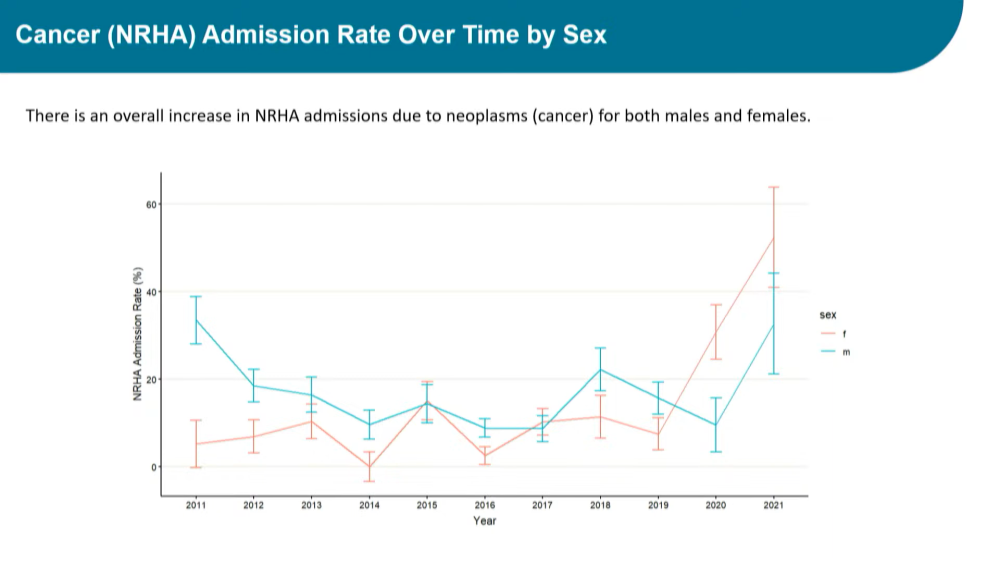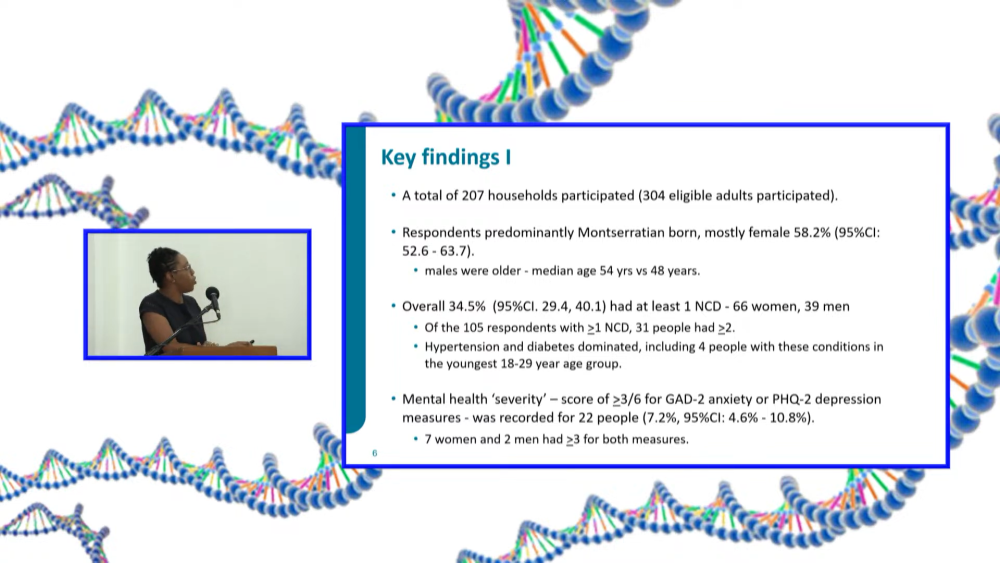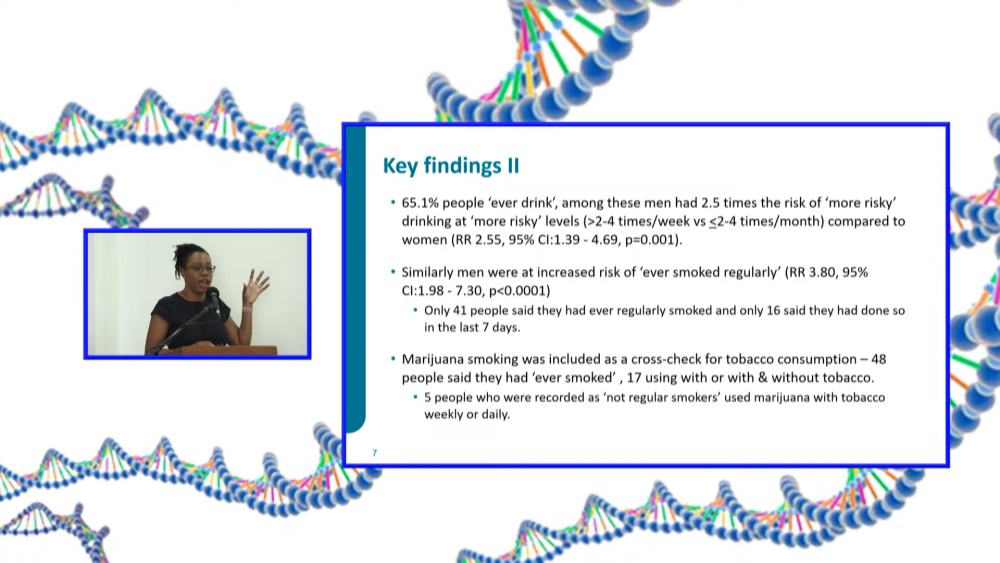A third of Montserrat’s population is living with a non-communicable disease such as Diabetes or Hypertension. These are the findings of health experts who presented at last Friday’s Research Day, a Ministry of Health & Social Services initiative streamed live to YouTube and Facebook.
Throughout the day, health practitioners presented their findings on a range of issues including hospital admissions, mental health, NCDs, school health, prevention of chronic kidney disease, and ending period poverty.
With an aging population and younger people now presenting with more chronic diseases, there is need for more preventative care and more community-based resources to help people manage chronic conditions and prevent acute illnesses, health experts noted.
Hospital Admissions Data
Dr. Abbie-J Harrison opened the presentations with an analysis of the clinical characteristics of patients admitted to the hospital. The purpose of which was to ascertain the impact on the healthcare system and understand healthcare utilization patterns.

Dr Harrison developed a diagnostic tool to map the Glendon Hospital’s admission records from 2011 to 2021 to the World Health Organisation’s ICD-10 Codes. ICD-10 is a medical classification list which contains codes for diseases, signs and symptoms, abnormal findings, complaints, social circumstances, and external causes of injury or diseases.
Her presentation noted that there had been a 12% decrease in Montserrat’s population from 4922 in 2011 to 4275 in 2022.
The island’s population is now primarily over the age of 40 and the age dependency ratio increased from 47.01% to 53.04%. Montserrat’s birth rate is lower than the death rate and more people are either too young or too old to work. This, Dr. Harrison noted has implications on social programmes, the economy and healthcare.
Of the 6033 admissions to the hospital over a 10-year-period, representing 3200 individuals, 54% were females and 45% were males. Length of stays ranged from zero to 243 days with an overall average of 5.9 days.
The most frequent hospital admissions were due to pregnancy/childbirth/puerperium, diseases of the circulatory system such as hypertension and heart failure, and endocrine nutritional and metabolic diseases such as diabetes.

Dr. Harrison noted that proximal diabetes was the commonest disease entity responsible for medical admission.
There has been an overall increase in hospital admissions due to cancer for both males and females. For women it is breast, colon and cervical cancer, while in men it is prostate, colon and lung.
Dr. Harrison noted that cancers of the colon can be successfully treated if diagnosed early.
School Health Assessments Show Increase in NCDs
Director of Primary Health Care Dr. Dorothea Hazel-Blake highlighted in her presentation the increasing trend of children being overweight at various stages of their school journey.
Using data compiled from the annual school health assessments conducted with children in nursery, primary and secondary, she noted one in four children were overweight. Noteworthy was the shift from girls being the ones primarily overweight in secondary school to boys over the period of 2019 to 2022.
More work was needed to understand the reason for the shift and how it can be reduced for both genders.
Dr. Hazel-Blake also indicated that Montserrat having a migratory population was clearly visible in the results as 76.4% of the children were checked only once in nursery to secondary school. Only 1.9% of the population had been seen at all three stages of their education journey.
Smoking Tobacco is Not the Same as Smoking Marijuana, according to Household Health Survey
Chief Medical Officer Dr Sharra Greenaway-Duberry was the final presenter for the day. Using data collected from 207 households during 2022, she sounded the alarm that one in three Montserratian residents have at least one non-communicable disease. The survey revealed that 34.5% admitted to having one NCD with 31 people in the sample having two or more NCDs.

Hypertension and Diabetes dominated the results with four people between the ages of 18 to 29 also living with these diseases. The CMO said during her medical school days it was believed that people over 40 and 50 were the ones who developed these NCDs and now that trend is going downwards, which connects to the results found in the school health assessment of increasingly more children being overweight.
On the issue of mental health, 22 people admitted to suffering with anxiety and depression.
65.1% said they drank alcohol with men 2.5 times more likely to drink more either daily or weekly. 41 people said they smoked, 16 of them in the last seven days. However, 48 people said they smoked marijuana with 17 using it daily or weekly. Dr. Greenaway-Duberry noted that five people said they were not smokers but used marijuana daily. “Culturally we think of smoking as tobacco not marijuana,” she explained, adding that they must now think about the messaging when educating people about smoking.

The CMO said the data will be used as a baseline but more investigation and qualitative research was needed on risky drinking, smoking and marijuana and mental health. The Ministry of Health & Social Services will be adapting and applying the findings into the design of their policy and plans for improving healthcare here.
Health experts throughout the day highlighted the burden of chronic non-communicable diseases and the risk the pose to the society but also the significant financial strain this places on the health sector. Better integrated data management systems, more promotion of prevention initiatives and using community health workers were some of the recommendations for reducing the burden of CNCDs.
Montserrat’s healthcare system is publicly funded and comprises of one hospital, four community clinics, one dental facility and “flying” specialisms. With limited access to specialized medical care, residents must travel abroad to access larger healthcare centres for specialised medical care. The challenges are further exacerbated by healthcare professionals seeking opportunities in other countries leading to a shortage of service professionals in the local health sector.
Watch all of the Research Data presentations at the link below.
Discover more from Discover Montserrat
Subscribe to get the latest posts sent to your email.



